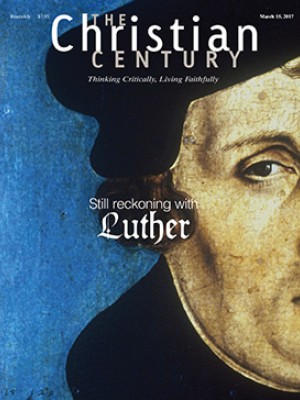Don't repeal the Johnson Amendment, fix it
We should limit political activity by churches—but not speech from the pulpit.

Donald Trump has threatened to “totally destroy” the Johnson Amendment governing religious organizations’ involvement in politics. That would be a serious mistake. But the Johnson Amendment does need to be refined. Like so many things in Washington, the issue is more nuanced than many of the advocates on either side will admit.
According to section 501(c)(3) of the Internal Revenue Code, most religious, charitable, and educational organizations in the private sector are tax-exempt. Their income, if they have any, is not taxable. Far more important, contributions to these organizations are tax-deductible for the donors.
Read our latest issue or browse back issues.
This generous tax treatment comes with eligibility requirements, and one of these requirements is controversial. A 501(c)(3) organization cannot endorse or oppose a candidate for political office, even by implication. Senator Lyndon Johnson inserted this restriction into a bill in 1954 after two tax-exempt organizations had attacked him politically.
If a church spends money to support a candidate, that money should be subject to the same rules as any other political expenditure. As the law stands, if I contribute to a political campaign, I do not get a tax deduction, my gift cannot exceed the limits in the campaign finance laws, and the gift has to be publicly disclosed. But if I contribute to a church or any other 501(c)(3) charity, I do get a tax deduction, there is no legal limit to how much I can give, and my gift does not have to be disclosed.
So if tax-exempt charities were allowed to endorse candidates, it would open a huge loophole in the campaign finance laws and create a very unlevel playing field. An ad that cost donors to a campaign $100,000 would cost those donors only about $60,000 if they routed their contributions through a church and took the tax deduction.
These reasons for the Johnson Amendment have nothing to do with separation of church and state. Churches have taken political positions throughout American history whenever moral issues became political issues. And that has been pretty often, from the movement to abolish slavery to the pro-life movement, from the era of the Social Gospel and Prohibition to the era of sanctuary churches.
The Johnson Amendment applies to religious and secular organizations alike. And it permits either kind of tax-exempt organization to spend money on politics if they do it right. A church could create an affiliated organization under section 501(c)(4) of the Internal Revenue Code, and that affiliate could create a political action committee. These affiliated organizations could contribute to candidates or spend freely to endorse them. These expenditures by affiliates would be subject to the same limits as all other political spending: no tax deduction, limits on the size of gifts, and public disclosure.
Churches have not created PACs or 501(c)(4) affiliates, and probably for good prudential reasons. Getting deeply involved in politics would not be illegal or unconstitutional for the church, but it probably would not be good for the church.
The real free speech problem here is that the Johnson Amendment is an absolute prohibition. It applies to sermons and other things that churches say in their ordinary operations that cost no money. If the pastor says vote for the pro-life candidate, and that’s the Republican, or vote for the candidate who will care for the poor, and that’s the Democrat, that’s political and religious speech at the very core of the First Amendment.
Pastors violate the government’s interpretation of the law even if they don’t identify a candidate or a party. Urging members to vote for the pro-life candidate is an implied endorsement even if no names are mentioned. A sermon on abortion, or social justice, or the war in Iraq preached close to an election can be an implied endorsement. To forbid this speech is government censorship of sermons, and it ought to be unconstitutional.
The restrictions of the Johnson Amendment should not apply in such cases because sermons cost no money. The pastor would have given a sermon on something on a Sunday morning no matter what he said. Therefore describing how the church’s moral teachings relate to the election doesn’t evade campaign finance regulation, and it doesn’t create a path for tax-deductible campaign spending.
There are no court rulings on this matter because the Internal Revenue Service has never filed enforcement actions over sermons—even when pastors have tried to provoke the IRS by sending videos of sermons endorsing candidates. The IRS sends out warnings before elections and it launches investigations after elections, but as far as is publicly known it has never revoked a tax exemption over a sermon or any other cost-free endorsement of a candidate.
No one knows why not. But I infer that IRS attorneys are afraid to litigate the constitutional issue. They might win; courts tend to defer to tax laws. But they might easily lose; requiring that we all do our political spending with after-tax dollars does not require the IRS to censor sermons.
The IRS did go after a church that paid for full-page political ads in major newspapers. The IRS won, and it should have won. That church spent a lot of money that had already been deducted from the donors’ taxes, and that undermines the whole system of campaign finance regulation. Free speech by pastors does not.
Wholly repealing the Johnson Amendment would protect both the sermons and the full-page ads. It would create pressure on churches to let themselves be used for tax-deductible campaign spending.
A far better solution: repeal the Johnson Amendment with respect to things that cost no money, and leave it in place for the things that do.
Recently introduced bills would do exactly that. The proposed Free Speech Fairness Act (S.264 in the Senate and H.R. 781 in the House) would say that no tax-exempt organization would lose its tax exemption, and no donors would lose their tax deduction, because of any statement “made in the ordinary course of the organization’s regular and customary activities in carrying out its exempt purpose” and which “results in the organization incurring not more than de minimis incremental expenses.”
This proposed statutory language would reach beyond sermons to other activities that have no marginal cost. For example, the Christian Century magazine is published by a tax-exempt 501(c)(3) organization, and its “ordinary and customary activities” are to publish articles. If it chose to publish an article endorsing a candidate, that article would not cause “incremental expenses” to the organization as long as it didn’t add pages to an issue. Articles of some kind would have filled the regular number of pages in any event. The for-profit media are allowed to endorse candidates; the pending bills would treat the nonprofit media equally.
So far the bills have only Republican sponsors. And they may be opposed by the extremes of opinion on both sides. Republicans may want to “totally destroy” the Johnson Amendment; they don’t much like campaign finance regulation anyway, and they might be happy to create an enormous loophole. Democrats might oppose repeal even for things that cost no money out of misplaced conceptions of the separation of church and state or fears that conservative churches will give more political sermons than liberal churches.
But government censorship of sermons is indefensible; there are good reasons why the IRS is apparently afraid to take churches to court over sermons. Tax deductions for political spending by churches and charities are equally indefensible. The middle ground here is the right ground: churches should not be free to spend tax-deductible contributions on politics, but they should be free to speak about their moral teachings, even when (perhaps especially when) those moral teachings have clear political implications.
A version of this article appears in the March 15 print edition under the title “Free speech in the pulpit.”






